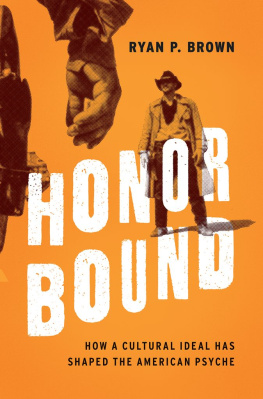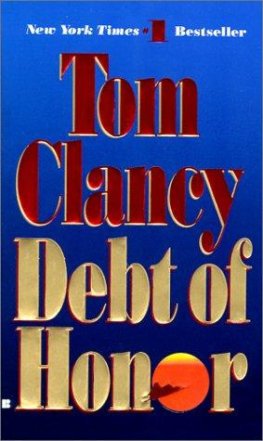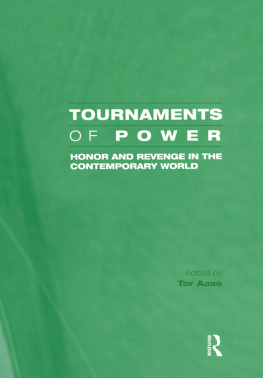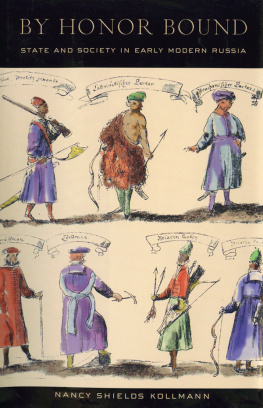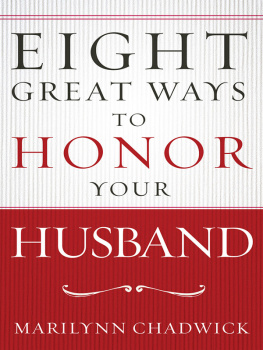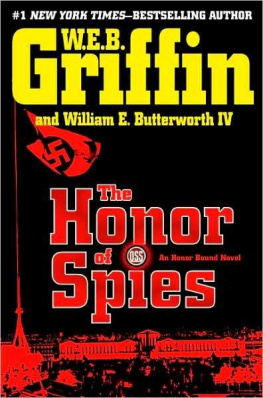HONOR BOUND

Oxford University Press is a department of the University of Oxford. It furthers the Universitys objective of excellence in research, scholarship, and education by publishing worldwide. Oxford is a registered trade mark of Oxford University Press in the UK and certain other countries.
Published in the United States of America by Oxford University Press
198 Madison Avenue, New York, NY 10016, United States of America.
Oxford University Press 2016
First Edition published in 2016
All rights reserved. No part of this publication may be reproduced, stored in a retrieval system, or transmitted, in any form or by any means, without the prior permission in writing of Oxford University Press, or as expressly permitted by law, by license, or under terms agreed with the appropriate reproduction rights organization. Inquiries concerning reproduction outside the scope of the above should be sent to the Rights Department, Oxford University Press, at the address above.
You must not circulate this work in any other form and you must impose this same condition on any acquirer.
Library of Congress Cataloging-in-Publication Data
Names: Brown, Ryan P.
Title: Honor bound : how a cultural ideal has shaped the american psyche /Ryan P. Brown.
Description: New York : Oxford University Press, 2016. |Includes bibliographical references.
Identifiers: LCCN 2015033718 | ISBN 9780199399864 | eISBN 9780199399888
Subjects: LCSH: HonorPsychological aspects.
Classification: LCC BJ1533.H8 B76 2016 | DDC 302/.1dc23
LC record available at http://lccn.loc.gov/2015033718
FOR CATHERINE, NATHAN, AND LUKE, WHO INSPIRE ME TO BE A MAN OF TRUE HONOR.
Contents
I love what I get to do for a living. There are very few things in the world more interesting than people, so learning that I could get paid to study people as a social scientist was a wonderful discovery that I made many years ago. That realization was followed by many more, including those described in this book on the cultural patterns known as the honor syndrome.
During the process of discovery in my honor odyssey, I have been aided and inspired by many people. First and foremost, researchers such as Richard Nisbett, Dov Cohen, and Joseph Vandello have captured my attention and fired my imagination, so I tip my hat to them with the deference they deserve. There are many other researchers besides these three whose work I discuss in this book or whose work has helped inspire my own (such as Susan Cross, Ayesha Uskul, Allan Dafoe, PJ Henry, and others), but no one has done more to elucidate some of the core elements of honor cultures than Nisbett, Cohen, and Vandelloat least within the field of social psychology.
Second, I could not have conducted any of my own research on the honor syndrome without the hard work and perseverance of many excellent graduate students, undergraduate research assistants, and fellow faculty members. Collaboration certainly makes science better, but it also makes it more fun, and the fun is often what keeps you going. For helping to make my own studies both better and more enjoyable, my sincere thanks go out to Lindsey Osterman, Collin Barnes, Michael Tamborski, Miki Imura, Kevin Green, Kiersten Baughman, Mauricio Carvallo, Lara Mayeux, Jennifer Barnes, Laura Thurman, Kevin Dodd, Chris Nguyen, and a host of undergraduate research assistants who have worked with me or my graduate students over the years on the studies I discuss in this book.
Third, I wish to extend special thanks to Stan Wakefield, who introduced me to the editorial team at Oxford University Press (OUP). Throughout this project, Abby Gross and her team at OUP have been a source of great encouragement as well as constructive editorial feedback. Likewise, Hunter and Kathy Miller were so gracious to open their lakefront home to me as I began writing this book. I am grateful for their generosity as hosts, and I am not sure I would have ever managed to begin the process of writing without the seclusion of this quiet retreat.
Last, I want to thank the love of my life, Catherine, and my sons, Nathan and Luke, who have had to put up with me not only as I wrote this book, but also as I continue to talk about the ideology of honor and why I think it is so important. I know you all get tired of hearing me proclaim, Hey! You know, theres a study on that ! Thank you for your patience and endurance, and for making my life so blessed.
Have you ever read something that changed your life? Almost 20 years ago, I did. It was a report on a set of studies conducted by a group of social scientists at the University of Michigan. The team was led by Richard Nisbett and Dov Cohen, and the topic of study was something they called the culture of honora phrase that social scientists use to describe a society that organizes social life around the maintenance and defense of reputation. In an honor culture, reputation is everything, so people go to great lengths to defend their reputations and those of their family and community against threats and insults. Indeed, as Southern historian Bertram Wyatt-Brown has noted, Honor is reputation (p. 14). Consequently, people who live in honor cultures are allowed or even expected to respond aggressively whenever they feel their honor is threatened. Furthermore, people in an honor culture seem to have their social radars specially attuned to detecting such honor-related insults, which can make them seem a little hypersensitive at times. What did you just call me? is the type of question that people in an honor culture recognize as a prelude to potential violence.
The gist of Nisbett and Cohens studies was that college guys who had grown up in the U.S. South were more likely to respond to an insult with aggression compared to college guys who had grown up in the North. The reason for this difference, the researchers argued, was the South (and, to a lesser extent, the West) has long been influenced by the ideology of honor. Social scientists would Nisbett and Cohens research struck me as clever and creative. This was the first time I had ever seen researchers calling people insulting names in a psychology study and then measuring things such as their cortisol level (which indicates stress), or how they played a game of chicken with a linebacker walking down the hall. I loved it.
For about the next decade or so, I talked about this set of studies when I taught social psychology to undergraduates at The University of Texas, then later at Amherst College and The University of Oklahoma. It was fun to discuss and explain, and my students always seemed to get a kick out of hearing about this work.
It wasnt until 2007 that this work started changing the course of my own career as a researcher. At that time, I was conducting studies on forgiveness and revenge with several graduate students, including Lindsey Osterman and Collin Barnes. Lindsey was trying to run an experiment on revenge after an insult. No one was signing up for the study, however, so to keep her research assistants busy and off the streets, she decided to have them scour the Internet to find cases of school shootings.
After a few weeks of searching, she had an initial list of more than 70 shootings, and at that point she told me what she was up to. I was intrigued. We talked about the project and decided to investigate whether time of year and location make any difference in the likelihood of a school shooting occurring. I then told her all about the research by Nisbett and Cohen on the culture of honor, and she was as fascinated by it as I was. Eventually, we went on to uncover more than 100 school shootings that had occurred in the United States between 1988 and 2008. Time of year, we found, did matter. Two of the most dangerous months of the year are December and May, which probably wont surprise anyone (these are the months when students take stressful final exams and learn whether they have passed their classes). However, one additional month that seems to have nothing to do with grades or exams also stood out as if you want to know what this month is and why we think that its so dangerous).

